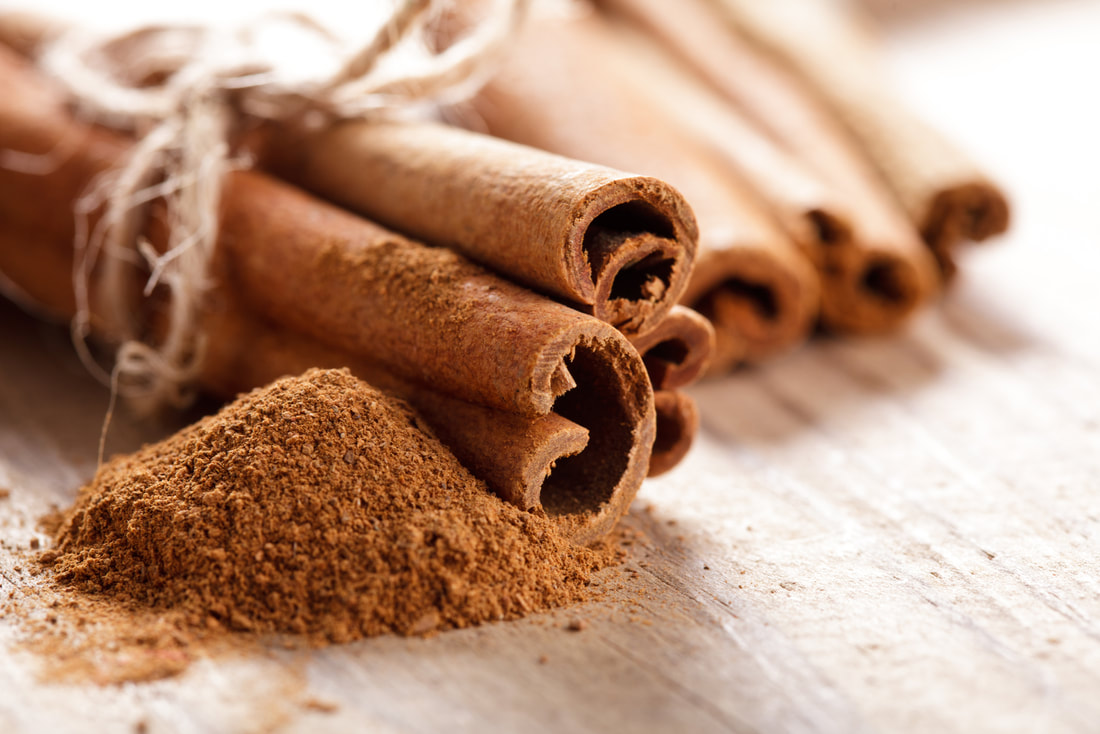|
When I think winter herbs, cinnamon immediately comes to mind. An herb that warms the system, I associate it with comfort foods...cinnamon buns, cookies, spice cake, sprinkled in hot chocolate, and oatmeal. Sweet and spicy all at once, it's a delightful addition to savory cooking. Curries and stir fries are amazing with a pinch of cinnamon!
How wonderful, then, that such a delicious herb has a wide array of therapeutic benefits, too! Cinnamon is considered a warming herb, and can be a great help to those who 'run cold' or are dealing with 'cold' afflictions. It is one of the 'anti' herbs. It is antimicrobial, antioxidant, antiseptic, antiviral as well as astringent, carminative, and demulcent. These actions make it perfect for use during cold season. Cinnamon is often included in cough syrups, cold and flu teas, and elderberry syrup. For those living with diabetes type 2, cinnamon can be a useful tool. The herb does this in two ways - by increasing the body's sensitivity to insulin, and by decreasing the amount of sugar released into the bloodstream. Cinnamon does this by interfering with certain digestive enzymes, slowing down the breakdown of carbohydrates in the digestive system. Cinnamon is also celebrated for its beneficial action on the cardiovascular system, its antioxidant content, anti-inflammatory properties, its positive effects against fungal growth, and its protective action against oral disease and cavities. There are two basic types of cinnamon to consider. The main difference between the two is the level of cinnamaldehyde in the herb. Cinnamaldehyde is what gives cinnamon its distinctive taste. Though you may think that more is better, there is such a thing as too much of a good thing. When using cinnamon therapeutically for chronic ailments, it is best to adopt an 'easy does it' attitude. Ceylon cinnamon is known as 'true' cinnamon. It comes from the inner bark of the Cinnamomum verum tree which grow in Sri Lanka and India. It is lower in cinnamaldehyde, and thus is a safer option for long term therapeutic use. Cassia cinnamon is from the Cinnamomum cassia tree which originates in China. It is higher in cinnamaldehyde. It is also higher in coumarin, which in large amounts can be damaging to the liver. It is the stronger tasting of the two cinnamons, and the cheapest. Thus it is the cinnamon most readily available at the grocery store, and is likely used in baking for this reason. In food amounts, cinnamon is quite safe. It should not be used therapeutically by pregnant ladies, however, as it can cause contractions. It is best to consult an herbalist for dosing specifics. Perhaps the best thing about cinnamon - or at least, the tastiest - is its effect on the digestive system. Cinnamon is a traditional digestive remedy, and combines especially well with ginger. Warming herbs kindle the body, building 'fire' and getting things moving. This is good news for those with a sluggish digestive system who need to encourage things along. It is normal for many cultures to partake in a digestive drink before and/or after meals, and cinnamon is often included in these teas. Try one for yourself with the recipe below: Cinnamon Digestive Tea 1 part cinnamon 1 part ginger 1/2 part clove 1 part mint Blend the first three ingredients together. Place 2 tablespoons of this blend into a pot with 2 cups of water. Simmer 10 minutes. Add 1 tablespoon mint, cover, and let steep for 5-10 minutes. Strain, sweeten with honey as desired, and sip slowly.
0 Comments
|
Emilie
Clinical herbalist. Mother. Teacher. Ever student. Archives
February 2022
Categories
All
|


 RSS Feed
RSS Feed